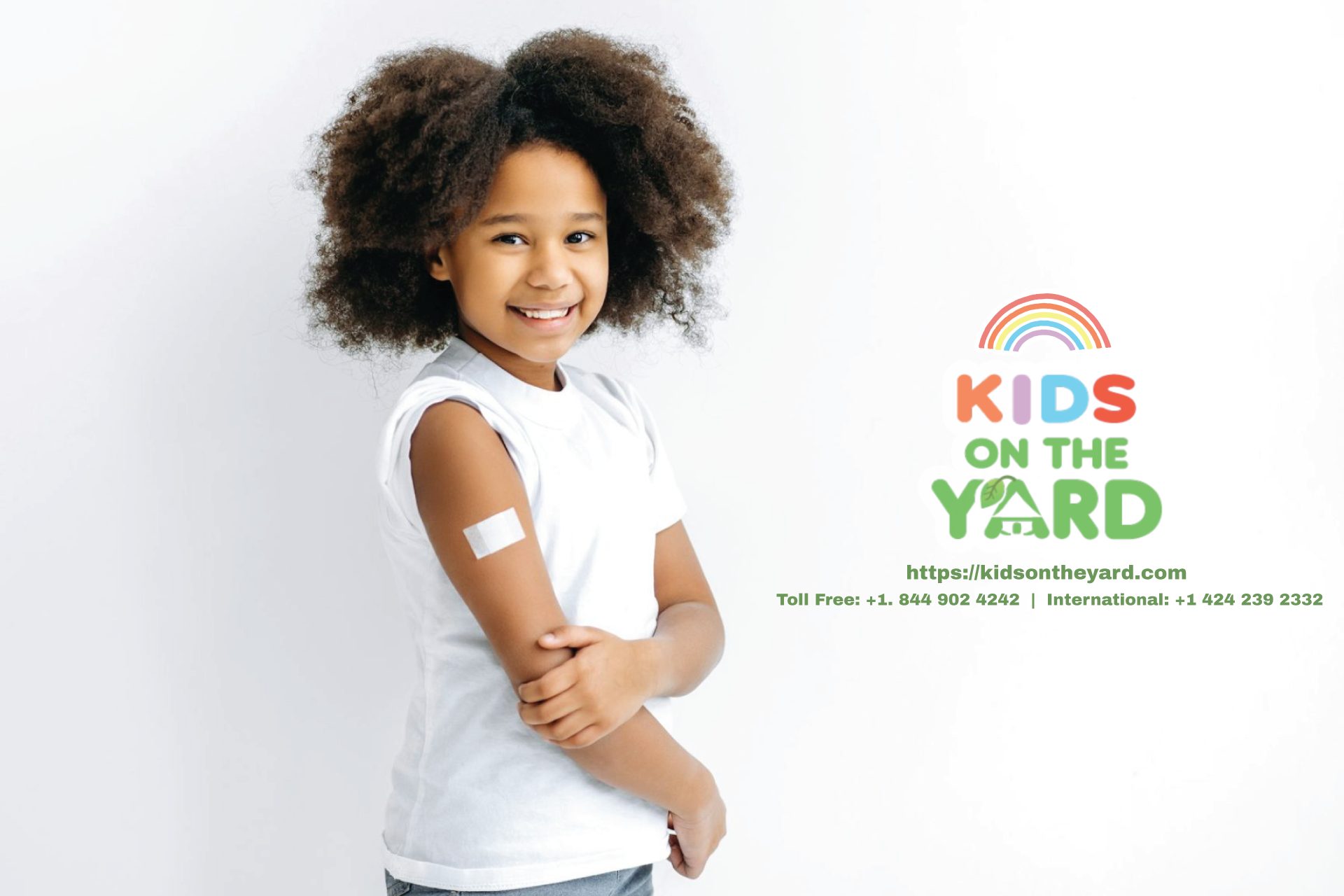|
Audio Article
|
At Kids on the Yard, we are dedicated to promoting resilience. Staying current with vaccinations is a vital part of that mission. Keeping children protected through routine immunizations helps them build strong, resilient bodies and prevents the spreading of infectious diseases.
“Now more than ever, ensuring that children are up-to-date with their routine immunizations is crucially important.”
Importance of Vaccines
Vaccines are crucial in protecting children from infectious diseases. They work by introducing a harmless piece of a virus or bacteria into the body, training the immune system to recognize and fight the disease if exposed in the future.
Historically, vaccination programs have been successful. Diseases like smallpox have been eradicated, while others like polio have seen significant declines. These accomplishments demonstrate the effectiveness of vaccines in safeguarding public health.
Despite clear evidence, vaccination efforts face challenges. Misinformation has led to confusion and fear, causing some parents to hesitate in vaccinating their children. This has contributed to declining vaccination rates in regions like South Africa, leaving children vulnerable to preventable diseases.
When vaccination rates decrease, diseases like measles continue to pose risks. Ensuring children receive routine vaccinations keeps these threats at bay. In South Africa, resources like the Road to Health booklet guide parents and caregivers on when and what vaccinations a child should receive.
Preventing Diseases
Vaccines commonly prevent measles and polio. Measles can lead to serious complications including pneumonia, encephalitis, and death. However, outbreaks have become rarer than in past decades, all thanks to immunizations.
Polio, once a fearsome disease that could lead to paralysis, has been largely controlled in most parts of the world due to widespread vaccination efforts. The near-elimination of polio demonstrates what is achievable with determination and science.
Vaccinations heavily reduce the prevalence of these diseases. They act as a shield, not just for those with vaccinations, but also for the community, reducing the disease’s ability to spread.
Understanding this impact is crucial. By keeping up with vaccinations, we ensure that our children’s world becomes safer and healthier, and they can focus on learning, growing, and playing.
Healthy Bodies
When the majority of a community is vaccinated, it creates a protective effect known as herd immunity. This is especially important for those who cannot be vaccinated, like newborns or individuals with certain medical conditions.
Regular immunizations promote strong, resilient bodies as children grow. When vaccinated, children are less likely to fall ill from preventable diseases, which means fewer sick days spent out of school or missing fun activities.
- Vaccines alleviate the burden on healthcare systems
- Resources can be allocated to other crucial areas
- Fosters a sense of community responsibility
By vaccinating their children, parents contribute to their children’s well-being and the collective health of the neighborhood.
Vaccines are key to building healthier communities and shielding children from preventable diseases. By embracing immunization, we support a future where infectious threats are minimized, allowing children to grow up in safety and health.
- World Health Organization. Immunization. Geneva: WHO; 2022.
- Centers for Disease Control and Prevention. Vaccines and Immunizations. Atlanta: CDC; 2023.
- UNICEF. Immunization programme. New York: UNICEF; 2023.
What are vaccines, and why are they important for children?
Vaccines protect children from infectious diseases by introducing a harmless part of a virus or bacteria to the body. This trains the immune system to recognize and fight the disease if exposed in the future, ensuring children remain healthy and resilient.
How have vaccines impacted global health historically?
Vaccines have eradicated diseases like smallpox and drastically reduced cases of polio. This success showcases the power of vaccines in preventing illnesses that once caused severe health problems globally.
What are some challenges to vaccination efforts today?
Despite clear evidence supporting vaccines, misinformation has created fear and confusion. This has led to declining vaccination rates in some areas, like South Africa, putting children at risk for preventable diseases.
Why is it dangerous if vaccination rates decrease?
Lower vaccination rates make it easier for diseases like measles to spread, posing a risk to children and the community. Routine vaccinations are essential for maintaining public health and preventing outbreaks.
What diseases do vaccines commonly prevent in children?
Vaccines prevent serious diseases like measles and polio. Measles can cause pneumonia, encephalitis, and even death, while polio can lead to paralysis. Immunizations have made outbreaks of these diseases much rarer.
What is herd immunity, and why is it important?
Herd immunity occurs when a large portion of a community is vaccinated, helping protect those who cannot be vaccinated, like newborns or people with certain health conditions. It reduces the spread of disease, safeguarding the entire community.
How do vaccines contribute to community health and healthcare systems?
Vaccines lessen the burden on healthcare systems by preventing diseases, allowing resources to be allocated to other critical areas. They foster a sense of community responsibility as vaccinated individuals help protect those around them.
How do vaccines promote children’s physical and emotional well-being?
Vaccinated children are less likely to contract preventable diseases, reducing sick days, school absences, and missed activities. This supports their overall development, allowing them to focus on learning, playing, and growing.
Where can parents find information on recommended vaccines for children?
In South Africa, parents can refer to resources like the “Road to Health” booklet, which provides information on the recommended vaccinations and the schedule for administering them. Globally, organizations like WHO, CDC, and UNICEF offer reliable vaccine guidance.
What role do parents play in building healthier communities through vaccination?
By vaccinating their children, parents contribute to their well-being and the collective health of their communities. This promotes a safer environment, allowing everyone to benefit from reduced disease risks.


